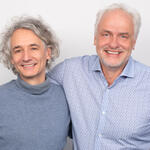Research as a future prospect for Ukrainian women
Until a few months ago, Dr Ilona Miaschenko lived in Chernihiv. The city in northeastern Ukraine was among the first to be attacked by the Russian army in spring 2022. Six months ago the bacteriologist fled to Germany along with her mother and three-year-old son. "In Ukraine I worked in a medical laboratory. I'm interested in how research in Germany is organised and whether working in a scientific environment would be an option for me," Miaschenko explains.
The process of gaining recognition for Ukrainian certificates and passing the necessary exams can take years
She is one of eight Ukrainian women who visited the Max Delbrück Center on a cool, cloudy autumn day in late September. The women are all medical scientists, some with years of experience and others still completing their training. They represent a range of disciplines, from biology to neurology, and since fleeing Ukraine they have been living in Germany, but are unable to continue their previous careers. Although their qualifications are fundamentally recognised, there are several obstacles to overcome before obtaining a medical licence in Germany – for example language tests, including a specialist language exam. "The process of gaining recognition for Ukrainian certificates and passing the necessary exams can take years," says Dr Oksana Seumenicht, who works in the research funding department at the Max Delbrück Center and also comes from Ukraine. She organised the visit together with her colleague Dr Olena Nemchyna from the German Heart Center Berlin.
Fewer administrative hurdles than in medicine
The intention was to give the visitors an insight into how science in Germany is organised and what kind of research the Max Delbrück Center is involved in, as well as giving them ideas for new career prospects. The visit was also designed to provide useful information, for example on the specific requirements for work placements or permanent jobs. One person who was able to share their knowledge was Alina Frolova, a researcher from the Institute of Molecular Biology and Genetics at the National Academy of Sciences of Ukraine and Kyiv University. She is currently working as a Max Delbrück Center Visiting Fellow in the Hypertension-Mediated End-Organ Damage research group along with Dr Florian Herse. "My research visit is being funded by the Volkswagen Foundation, which set up one of the first fellowship programmes for people fleeing Ukraine," she says. She adds that in Germany, unlike in Ukraine, there are generally numerous opportunities to obtain research funding. However, you first need an institutional cooperation partner. Frolova had previously worked with the Hypertension-Mediated End-Organ Damage group, with whom she had published joint papers, with the result that she readily obtained an invitation to come and work in Berlin.
Alina Frolova gives the visitors an overview of the possibilities for research funding
Dr Ulrich Scheller from the Berlin-Buch campus management team, who studied in the Ukrainian city of Kharkiv, had already provided the visitors with an overview of institutes and companies based at the campus and their areas of research. Dr Gesa Schäfer, commercial director of the Experimental and Clinical Research Center (ECRC), gave the Ukrainian visitors an outline of how research and recruitment work at the ECRC, which serves as a platform for cooperation between researchers engaged in basic research and practising clinicians. The programme also included a visit to the electron microscopy unit at the Leibniz-Forschungsinstitut für Molekulare Pharmakologie (FMP), accompanied by Dr Dmytro Puchkov. The day was rounded off with a networking dinner that gave the visitors the opportunity to chat and ask questions in more detail. "Many of them are keen to work as doctors again, a profession that enjoys a high status in Ukraine as in other countries. Because many of the women don't know how long they will remain in Germany, some of them are considering spending time working in research. A number of them were involved in research projects in Ukraine, and in research there are fewer administrative hurdles," says Seumenicht. This visit gave the Ukrainians an opportunity to gather ideas in this area.
Text: Wiebke Peters
Further information
- Clinical research at the ECRC
- Volkswagen Foundation Funding for Refugee Scholars and Scientists from Ukraine (applications no longer being accepted)
- Support services for refugees / Helmholtz Association
- FMP
- German Heart Center Berlin





